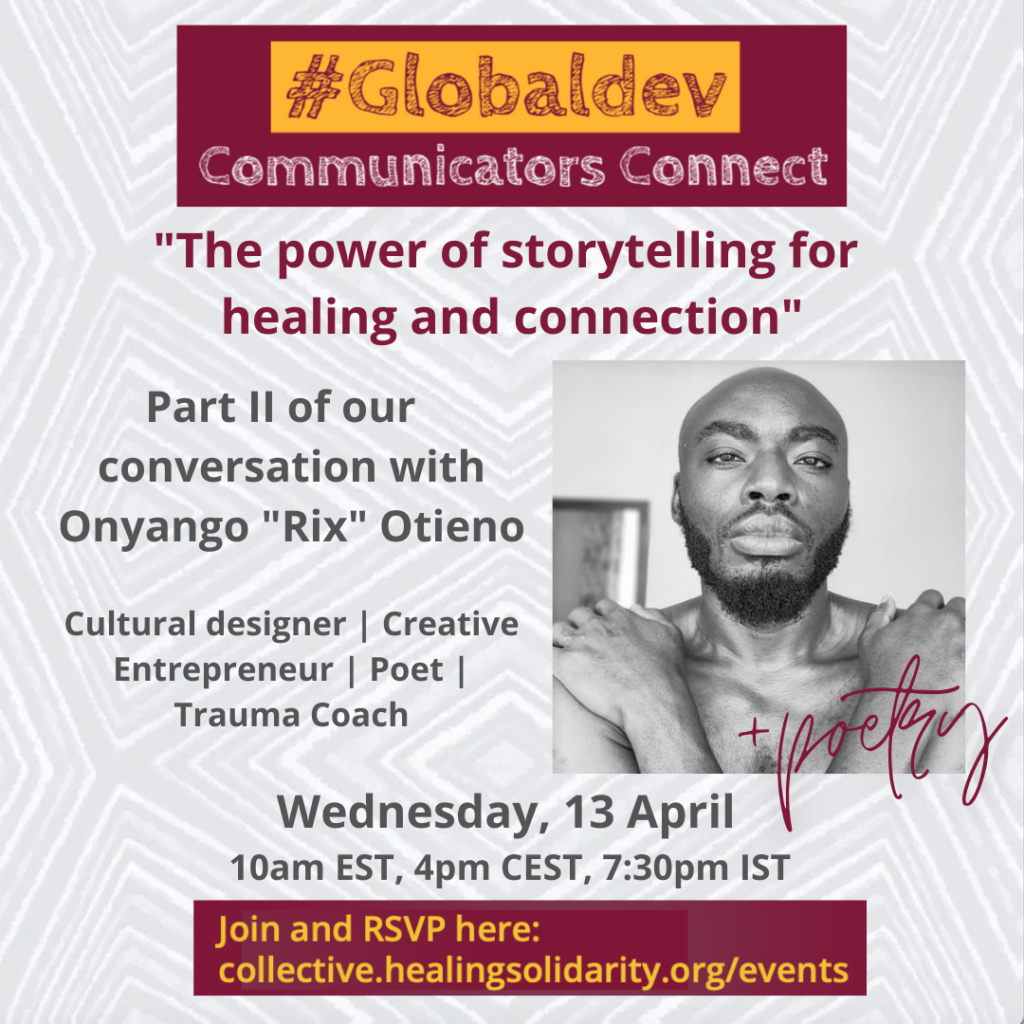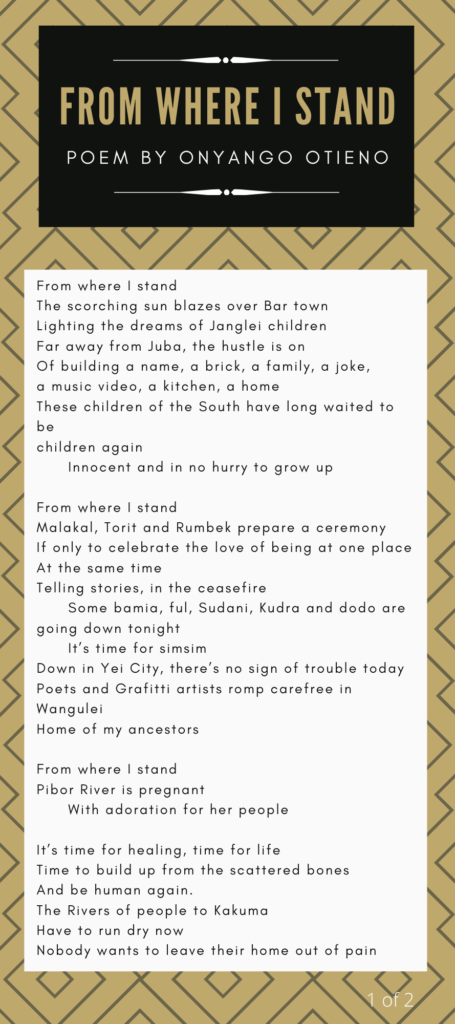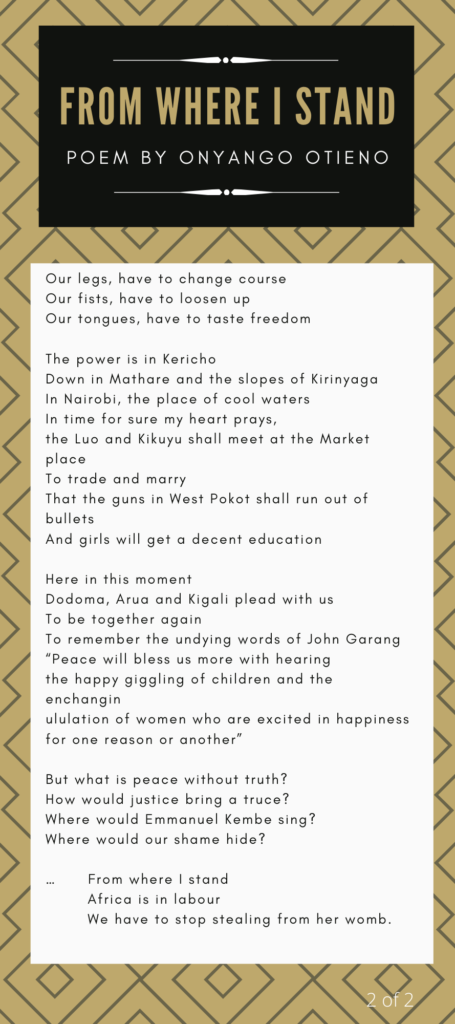
We were so glad and grateful to welcome Onyango Otieno as our special guest in March and April’s #Globaldev Communicators Connect in the Healing Solidarity Collective. Part II of our interview below shows why:
Jennifer Lentfer: For me, as a communicator, I’m often encountering my own hopelessness, particularly at this time. The state of the world is characterized by state and interpersonal violence, as well as economic exploitation and extraction and the climate crisis. And then whenever I encounter your work, Onyango, I’m reminded of the power of truth telling when it comes to creating new cultural realities. As you said, this is about cultural design. How important that truth telling is, when everything feels dire and hopeless!
Why is “reclaiming storytelling to connect and heal” so important to you right now?
Onyango Otieno: When you think of yourself, and all of us who are here, all of us have a story to tell. And our stories are very important to us. Now what I’ve often found is that many people live with so much shame to express who they are.
The shame definitely is coming from the messages that they received and perceived in their conditioning and their socialization – about who they were, about their race, about their gender, about their sex, about their faith or their beliefs, about their geographical area, about where they live in the city.
All those things, just layers upon layers upon layers of perception. They just sit with you. They sit with you every single day after day, day after day, and they create a system of thought. Your repeated perceptions create a system of thought that later forms your identity.
For many of us, actually, a lot of our identity is formed from ideas that we received from outside. It’s not like something that comes from within.
And that’s why storytelling is very important. Because when I communicate myself – as an African, as a heterosexual, cisgender person coming from Nairobi, who grew up in a certain setting – I want policies that are going to be made to cater to those needs that I have, that would contribute to my well being. I’m communicating that so that when I’m working out here, I might be treated as a human being who is valuable, that my stories have value, that my existence has value. That if I go to an airport somewhere, I’m not going to be searched for longer than other people just because of my skin color, or because of my religion.
We must communicate these stories in truth, so that we can see one another.
I’ll give you an example. We grew up with a lot of American media here in Kenya. In 2001, when 9-11 was happening, I remember it was a Tuesday. I was 14 years old. I’m coming home in the evening, and all of a sudden, everywhere, in every news channel, there are these two buildings that are burning that I never heard of ever in my life, the Twin Towers. There’s these planes coming through and just there’s so much hullabaloo going on. That day, I had just bought this laser watch that I wanted to impress my crush with in class.
That’s my biggest memory about 9-11 because I had just bought this laser watch I had been saving for. I went to school, and I just wanted her to see it. And then I’m coming home. It’s bad news, and people are dying, and all this stuff. And then those buildings come down.
So the years that followed…of course, 9-11 was like a huge, huge, huge occurrence in the US, and in the world. What I admire most is how Americans talk about what matters to them. They talk it out, about what matters to them. The world must know what matters to Americans – in their news telling, in their storytelling, in their stories in Hollywood. Everywhere, right?
Then, when I’m growing in my consciousness, I realized, “Oh, but you know, in the 90s, I used to see stories is about war in Yugoslavia, and the Rwandan genocide, and the war in Middle East on the TV. None of these things made the world stop in the magnitude in which 9-11 did.
So you’re growing up and you’re asking yourself these questions. Are other people’s stories bigger than other people’s stories? This is why truth telling in storytelling today is important.
All of us have a stake on this earth, just by our existence. And so all our stories are important.
We deserve equal time. We deserve equal measure of value. We deserve equal measure of resources – just because we are here. But you see most times it’s the person whose story is out there that gets more resources. So I’m telling people [my story], and not just on an individual level. I’m telling people on a cultural level, on a community level, on a racial level, on a sexual identity level, that we have to communicate who we are. And our stories have to be heard. Because we must be seen.
Jennifer Lentfer: 1000 times yes. I was wondering if you would read your poem about some of those stories that aren’t heard enough. It’s called from, “From where I stand.”
Onyango Otieno: With what’s happening in the Ukraine today, again we have forgotten about the rest of the world and what’s happening elsewhere. I remember in 2018, I was invited by a South Sudanese contingent to just celebrate with them the life of John Garang. John Garang was a big leader in South Sudan who was working to help them with the peace negotiations there with the rest of Sudan, as well as a lot of the intercultural issues that the country was having at the time. They asked me to write them a poem in order to perform something for them. In Kenya, I come from the Luo community and my ancestors migrated from South Sudan actually. So there I was amongst my brothers and sisters, my people. And sometimes our language is also quite similar. But they are the originals, so this poem is titled “From Where I Stand,” and it’s a story about my ancestors and the people of South Sudan.


Read Part I of the interview with Onyango here.
***
You can listen to a recording of Onyango’s March #Globaldev Communicators Connect conversation with Joan Okitoi-Heisig in the Healing Solidarity Collective here.
#GlobalDev Communicators Connect is a monthly meeting created and hosted by Joan Okitoi-Heisig and myself in the Healing Solidarity Collective to support people responsible for external communications in international aid and philanthropy to connect to each other.
On the second Wednesday of each month, we gather to learn from other communicators in the sector, ignite our creativity, and reflect on where/when we personally might be able to take more “risks” to invite change in how our organizations communicate about our work. We dare to invite the uneasy conversations and get inspired by each other.
***
Related Posts
“The Samaritans”: Why are some laughing? Some offended?
Reimagining Nonprofit Communications in a Hyper-Connected World
10 “big picture” communications questions for the social good sector
The power of the pen: Why I left M&E behind for communications

